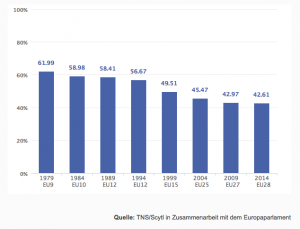
Democratic engagement is an issue. We know it and the European Commission knows it. Voter registration, engagement in the political processes and, crucially, voter turnout are problems as old as democracy itself, which unsurprisingly continue to present challenges in the 21st century. The Commission has, however, released a grant for new technologies to have a go at solving it.
Voter Turnout
Voter turnout in the EU has been slipping since 1979. At the 2014 elections, Germany had 48.10%, Spain had 43.81%, and the UK just 35.60%. The low turnout for EU elections in the UK  is hardly surprising in the wake of Brexit, yet a quick look at the numbers surrounding even that historic vote shows some interesting statistics. Just 72.20% of eligible Brits turned out to vote at the referendum and while this is the highest turnout since 1992 many were left blaming the decisive result on those who failed to cast their ballot.
is hardly surprising in the wake of Brexit, yet a quick look at the numbers surrounding even that historic vote shows some interesting statistics. Just 72.20% of eligible Brits turned out to vote at the referendum and while this is the highest turnout since 1992 many were left blaming the decisive result on those who failed to cast their ballot.
The solution, it would seem, is E-democracy. The EU has offered an action grant to investigate ways of increasing and sustaining democratic engagement. They are looking at proposals that will work alongside the existing European framework – optimising and securing the European democracy in the modern age.
Digitalising Democratic Engagement
The Commission is aware that the issue may not have an easy answer. They are open to looking at bids considering any and all digital tools, applications or internet services focused on increasing democratic participation. The key target groups are young people and “mobile EU citizens”.
Interestingly, there are only a few mentions as to what the European Commission is looking for. They mention implementing an e-voting pilot scheme perhaps aimed at the 2019 elections. However, the grant emphasises the need for a “good practice guide”. This suggests that what exactly a “pilot E-voting project” entails has not yet been decided.
It is a step in the right direction in any case. It is abundantly clear that European politics needs to appeal to a wider range of voters in general. Yet European politics needs to have a significant increase in democratic engagement from young voters as they ultimately represent its future. Similarly, mobile voters need to be engaged as they represent one of the EU’s greatest democratic triumphs.
The Commission is ideally looking for at least two transnational projects with budgets between 75,000 and 350,000 euros. The deadline for proposals is today so watch this space.